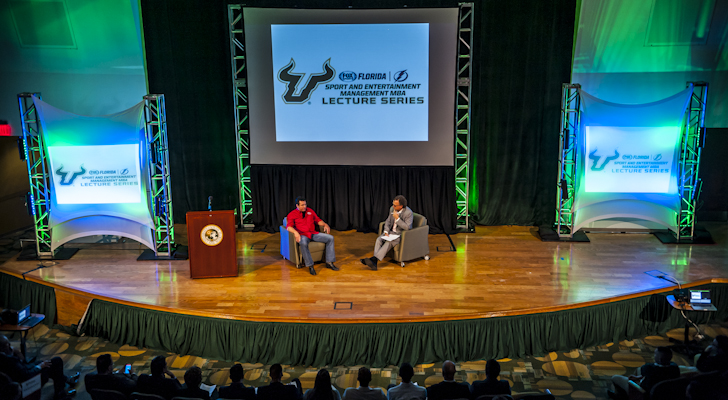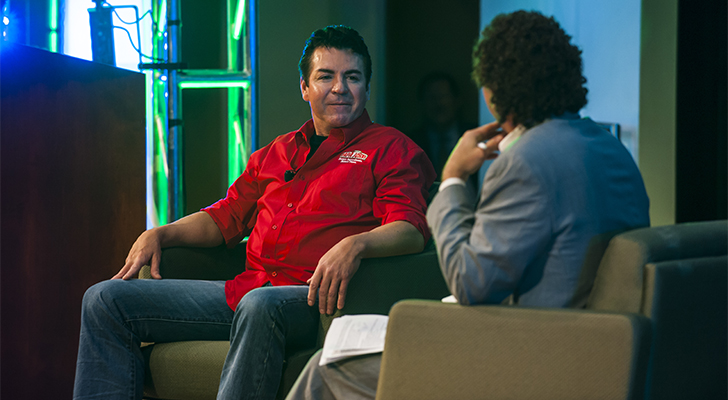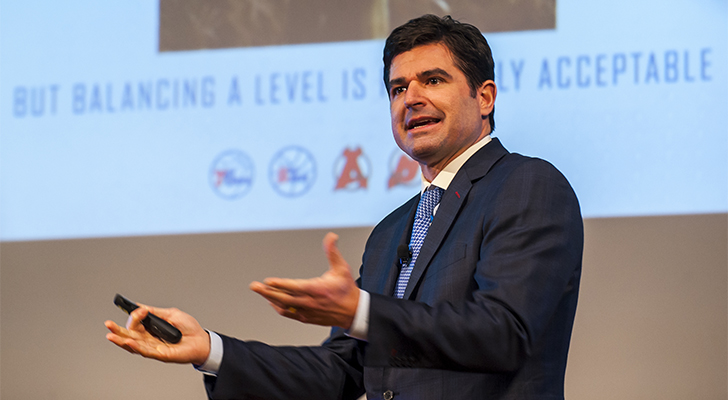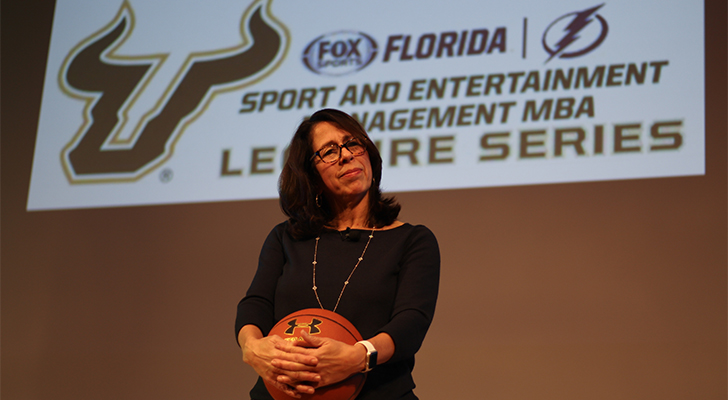
"Papa John" Schnatter spoke to USF students, faculty, and community members through an onstage conversation with sports journalist Abe Madkour.
TAMPA, Fla. (Jan. 19, 2016) – Building corporate culture, leveling the sports playing field across genders, and building a better pizza were all among insights the USF community gained recently from lectures by giants in the sports and entertainment industry.
John “Papa John” Schnatter, the successful pizza entrepreneur, and Scott O'Neil, the CEO of the Philadelphia 76ers NBA team, the New Jersey Devils NHL team, and the Prudential Center arena, spoke at the Marshall Student Center’s Oval Theater and shared insights from their lives and careers on the first day of the lecture series, and the series closed with former WNBA President Donna Orender speaking the next day.
The speakers featured in this year’s USF Sport & Entertainment Lecture Series, presented by Fox Sports Florida and the Tampa Bay Lightning. The lecture series is organized by the USF Muma College of Business Sport & Entertainment Management Program, which is in its fourth year at USF. The program offers a path for students to gain their MBAs and gain experience through residencies with partner organizations -- including the Tampa Bay Lightning, which is the founding partner of the program.
“Papa John” Schnatter
One of the country’s leading entrepreneurial father figures couldn’t find a job when he got out of college in the 1980s. But the first pizza he sold out of a broom closet in the back of his father’s bar changed all that.
John “Papa John” Schnatter’s story is a tale of bootstraps and stick-to-it-iveness: he moved back home after graduating from Ball State University with a degree in business, and sold his beloved Camaro Z28 for $2,800 to keep his father’s bar, Mick’s Lounge, in business. He had always dreamed of selling pizza, even almost quitting college to open another chain’s franchise. But after he started selling pizzas at Mick’s lounge in 1984, the 100th Papa John’s restaurant was opened in Clarksville, Tenn., just seven years later.

"Papa John" Schnatter
“What I tell young people today is, ‘Find something you love to do and something you’re good at,’” Schnatter said. Pizza turned out to be both for him. With more than 4,700 Papa John’s in 37 countries and over $1 billion in sales, Papa John’s Pizza is now one of the largest takeout and delivery restaurant chains in the world.
“It’s a very challenging business, but I love what I do every day,” he said.
Schnatter spoke to USF students, faculty, and community members through an onstage conversation with Abe Madkour, who is a sports journalist and executive editor of the of Street & Smith’s SportsBusiness Journal, SportsBusiness Daily and SportsBusiness Daily Global.
Schnatter founded Papa John's Pizza in 1984 and opened the first restaurant a year later in a bar his father owned. Thirty years later, consumers worldwide know its slogan of "Better Ingredients. Better Pizza. Papa John's.” Schnatter spoke extensively about building the brand during the conversation, especially through sports marketing.
Muma College of Business Dean Moez Limayem introduced the talk, saying that having speakers of this caliber come to USF fits with the college’s goal of having the best-prepared and trained business students.
“We bring the best speakers and entrepreneurs to share with our students,” Limayem said.
Calling Schnatter “one of the true success stories in American entrepreneurship,” Madkour asked him about how he came up with the idea for the pizza company.
“You’ve so effectively used sports to market your brand,” Madkour noted. “When did you realize sports would be a good platform?”
Schnatter said he realized that sports had huge swing and influence over fans’ loyalties. He said that while other pizza chains spend double and triple the advertising budget, Papa John’s concentrates on reaching a specific audience and being effective.
“Sports are like pizza: they bring friends and family together,” Schnatter said.
Scott O’Neil
Examples of good corporate culture are held up all the time for accolades and imitation: an employee recognition program, or the office softball team. But less often singled out is what happens in the absence of employee culture: an employee knitting with noise-canceling headphones at the Grammy Awards, or a security guard asleep on the job.
“What do you think the culture is like there?” said Scott O’Neil, who helms the Philadelphia 76ers, New Jersey Devils, and Prudential Center as CEO. O’Neil is known in the industry for fostering talent and creating a corporate culture employees want to be part of, with the Philadelphia 76ers recognized as one of 2015's best places to work in the city. O'Neil's leadership has also resulted in the Devils and Sixers being among the top teams in key metrics, including season ticket holder growth and renewal rate.
He spoke on Wednesday encouraging audience members to find their “why”: what motivates them?
O’Neil was
introduced by his mother, Mary Ann O’Neil, who teaches courses in USF’s Sport
& Entertainment Management program. She spoke about her struggles with
O’Neil as a fifth-grader, when she told his teacher, “He’s fired up all the
time, he’s tough to manage.”

Scott O'Neil is the CEO of the Philadelphia 76ers, New Jersey Devils, and the Prudential Center.
That teacher told her O’Neil was passionate and determined - qualities she and many sports organizations have come to value.
O’Neil spoke about his mother, in turn, as one of three ways he learns best: family, experience and failure. He spoke about how he had learned his work ethic from his mother, who earned a PhD in her 60s. He noted his first promotion - from being an executive assistant at the then-New Jersey Nets getting coffee and dry-cleaning - came when he was at the office on a weekend fixing the copier.
He also spoke about the experience and failure elements. Regarding experience, he encouraged the group to have an attitude of continuing learning. With failure, he copped to some of his own mistakes in many positions - he has held executive positions with Madison Square Garden, the NBA and the Philadelphia Eagles, to name a few.
“I’ve had several. In a job like mine, they’re often public,” he said, as a New York Times headline appeared on the screen behind him: “President of Madison Square Garden Leaves.” (The word “leaves” should be in quotation marks, he added.)
“You want to find humility?” he asked. “Get fired in New York.
Those experiences shaped O’Neil, and in turn, he has focused on creating corporate cultures where employees can grow together and focus on what matters - last year, his employees contributed more than 10,000 hours in community service.
“If you’re an introvert, you might not succeed in this environment,” he said. “If you want to feel like a team, you’ll love this environment.”
Several audience members found one image in O’Neil’s talk especially compelling: a photo of a sign that said:
“The Main Thing
Is To Keep
The Main Thing
The Main Thing.”
Audience members raised their cell phones to capture the image themselves, a reminder that while the focus for a business may be obvious, it takes effort to keep that focus at the forefront.
O’Neil said he aims to teach people how to be a leader and to understand what good management looks like. He spoke about how he worked with employees at his companies to determine the corporate values, such as “collaboration wins,” “know they customer,” and “push for greatness.” Employee buy-in has made them workplaces where everyone knows that being there means full commitment.
“It’s not my culture,” he said. That’s the beauty of this.”
Donna Orender
Closing out the two-day lecture series, Donna Orender brought a basketball on stage with her - a symbol of the sport that made her who she is, both as a women’s professional basketball player and as the former president of the WNBA.
She asked the audience whether, if they were corporate executives, they would take advantage of a talent-enhancement pill for their workforce, one with only benefits and no side effects. Now, what if that pill was only available for half the workers? For much of history, she said, that has been sports: offering benefits to all, but often available only to men.
“This ball in particular is a game-changer,” she said. “It fortifies our sons. It empowers our daughters.”
Introducing Orender, USF Sport & Entertainment Management program faculty members Michelle Harrolle and Janelle Wells spoke about Orender’s accomplishments: a six-sport athlete who rose to the position of senior vice president of strategic development with the PGA Tour and later president of the WNBA. Orender now is founder and CEO of the Jacksonville women's leadership conference GenerationW, where she focuses on educating, inspiring, and connecting women and girls.

Donna Orender
“Donna is a successful, amazing woman who is obviously a trailblazer,” Harrolle said.
Orender spoke about the need to level the playing field across genders - in the game, in the media, and in the boardroom. She told the story of how, when she was growing up in the 1970s, her school didn’t have a girls tennis team. She asked the coach of the boys team if she could play - he made her play another boy for the last spot on the team. She made the team, making her the first girl to play for a boys tennis team in New York.
“The first thing you’ve got to do is you’ve got to ask,” she said, adding that she carries that lesson with her today. “All I ever wanted, and all I still want, not just for myself but for everyone, is opportunity.”
Although sports has a ways to go toward equality, Orender said, she noted some recent achievements: watching the U.S. women’s team win the FIFA world cup and get their own ticker-tape parade, just like any men’s team.
“Talent should be celebrated,” she said.
She also mentioned San Antonio Spurs Coach Gregg Popovich, who recently hired Becky Hammon as the first female assistant coach in the NBA.
“Young men and young women can now see elite male athletes intently listening to a coach,” one who happens to be a woman, she said.
In the sports boardroom, though, progress is slower, she noted. There is no professional league with a woman at its helm. Women’s sports merit only 2 percent of the coverage on ESPN’s SportsCenter. Men’s college teams charge for attendance, while women’s sports are free, even at schools where women’s teams have a winning legacy.
But it’s not just women’s issue to fix, she told the students in the room who are coming up in the sport & entertainment industry.
“It’s all of our collective issue,” she said. “The game is no longer for us to assimilate - it’s for all of us to collectively use our voices to frame and reframe.”